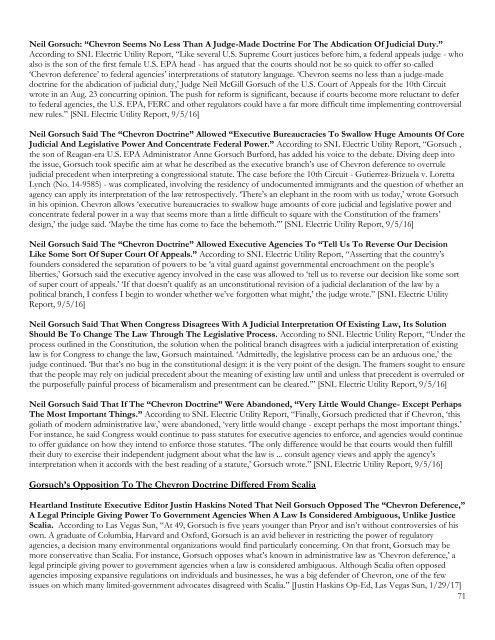You also want an ePaper? Increase the reach of your titles
YUMPU automatically turns print PDFs into web optimized ePapers that Google loves.
<strong>Neil</strong> <strong>Gorsuch</strong>: “Chevron Seems No Less Than A Judge-Made Doctrine For The Abdication Of Judicial Duty.”<br />
According to SNL Electric Utility Report, “Like several U.S. Supreme Court justices before him, a federal appeals judge - who<br />
also is the son of the first female U.S. EPA head - has argued that the courts should not be so quick to offer so-called<br />
‘Chevron deference’ to federal agencies’ interpretations of statutory language. ‘Chevron seems no less than a judge-made<br />
doctrine for the abdication of judicial duty,’ Judge <strong>Neil</strong> <strong>McGill</strong> <strong>Gorsuch</strong> of the U.S. Court of Appeals for the 10th Circuit<br />
wrote in an Aug. 23 concurring opinion. The push for reform is significant, because if courts become more reluctant to defer<br />
to federal agencies, the U.S. EPA, FERC and other regulators could have a far more difficult time implementing controversial<br />
new rules.” [SNL Electric Utility Report, 9/5/16]<br />
<strong>Neil</strong> <strong>Gorsuch</strong> Said The “Chevron Doctrine” Allowed “Executive Bureaucracies To Swallow Huge Amounts Of Core<br />
Judicial And Legislative Power And Concentrate Federal Power.” According to SNL Electric Utility Report, “<strong>Gorsuch</strong> ,<br />
the son of Reagan-era U.S. EPA Administrator Anne <strong>Gorsuch</strong> Burford, has added his voice to the debate. Diving deep into<br />
the issue, <strong>Gorsuch</strong> took specific aim at what he described as the executive branch’s use of Chevron deference to overrule<br />
judicial precedent when interpreting a congressional statute. The case before the 10th Circuit - Gutierrez-Brizuela v. Loretta<br />
Lynch (No. 14-9585) - was complicated, involving the residency of undocumented immigrants and the question of whether an<br />
agency can apply its interpretation of the law retrospectively. ‘There’s an elephant in the room with us today,’ wrote <strong>Gorsuch</strong><br />
in his opinion. Chevron allows ‘executive bureaucracies to swallow huge amounts of core judicial and legislative power and<br />
concentrate federal power in a way that seems more than a little difficult to square with the Constitution of the framers’<br />
design,’ the judge said. ‘Maybe the time has come to face the behemoth.’” [SNL Electric Utility Report, 9/5/16]<br />
<strong>Neil</strong> <strong>Gorsuch</strong> Said The “Chevron Doctrine” Allowed Executive Agencies To “Tell Us To Reverse Our Decision<br />
Like Some Sort Of Super Court Of Appeals.” According to SNL Electric Utility Report, “Asserting that the country’s<br />
founders considered the separation of powers to be ‘a vital guard against governmental encroachment on the people’s<br />
liberties,’ <strong>Gorsuch</strong> said the executive agency involved in the case was allowed to ‘tell us to reverse our decision like some sort<br />
of super court of appeals.’ ‘If that doesn’t qualify as an unconstitutional revision of a judicial declaration of the law by a<br />
political branch, I confess I begin to wonder whether we’ve forgotten what might,’ the judge wrote.” [SNL Electric Utility<br />
Report, 9/5/16]<br />
<strong>Neil</strong> <strong>Gorsuch</strong> Said That When Congress Disagrees With A Judicial Interpretation Of Existing Law, Its Solution<br />
Should Be To Change The Law Through The Legislative Process. According to SNL Electric Utility Report, “Under the<br />
process outlined in the Constitution, the solution when the political branch disagrees with a judicial interpretation of existing<br />
law is for Congress to change the law, <strong>Gorsuch</strong> maintained. ‘Admittedly, the legislative process can be an arduous one,’ the<br />
judge continued. ‘But that’s no bug in the constitutional design: it is the very point of the design. The framers sought to ensure<br />
that the people may rely on judicial precedent about the meaning of existing law until and unless that precedent is overruled or<br />
the purposefully painful process of bicameralism and presentment can be cleared.’” [SNL Electric Utility Report, 9/5/16]<br />
<strong>Neil</strong> <strong>Gorsuch</strong> Said That If The “Chevron Doctrine” Were Abandoned, “Very Little Would Change- Except Perhaps<br />
The Most Important Things.” According to SNL Electric Utility Report, “Finally, <strong>Gorsuch</strong> predicted that if Chevron, ‘this<br />
goliath of modern administrative law,’ were abandoned, ‘very little would change - except perhaps the most important things.’<br />
For instance, he said Congress would continue to pass statutes for executive agencies to enforce, and agencies would continue<br />
to offer guidance on how they intend to enforce those statutes. ‘The only difference would be that courts would then fulfill<br />
their duty to exercise their independent judgment about what the law is ... consult agency views and apply the agency’s<br />
interpretation when it accords with the best reading of a statute,’ <strong>Gorsuch</strong> wrote.” [SNL Electric Utility Report, 9/5/16]<br />
<strong>Gorsuch</strong>’s Opposition To The Chevron Doctrine Differed From Scalia<br />
Heartland Institute Executive Editor Justin Haskins Noted That <strong>Neil</strong> <strong>Gorsuch</strong> Opposed The “Chevron Deference,”<br />
A Legal Principle Giving Power To Government Agencies When A Law Is Considered Ambiguous, Unlike Justice<br />
Scalia. According to Las Vegas Sun, “At 49, <strong>Gorsuch</strong> is five years younger than Pryor and isn’t without controversies of his<br />
own. A graduate of Columbia, Harvard and Oxford, <strong>Gorsuch</strong> is an avid believer in restricting the power of regulatory<br />
agencies, a decision many environmental organizations would find particularly concerning. On that front, <strong>Gorsuch</strong> may be<br />
more conservative than Scalia. For instance, <strong>Gorsuch</strong> opposes what’s known in administrative law as ‘Chevron deference,’ a<br />
legal principle giving power to government agencies when a law is considered ambiguous. Although Scalia often opposed<br />
agencies imposing expansive regulations on individuals and businesses, he was a big defender of Chevron, one of the few<br />
issues on which many limited-government advocates disagreed with Scalia.” [Justin Haskins Op-Ed, Las Vegas Sun, 1/29/17]<br />
71


